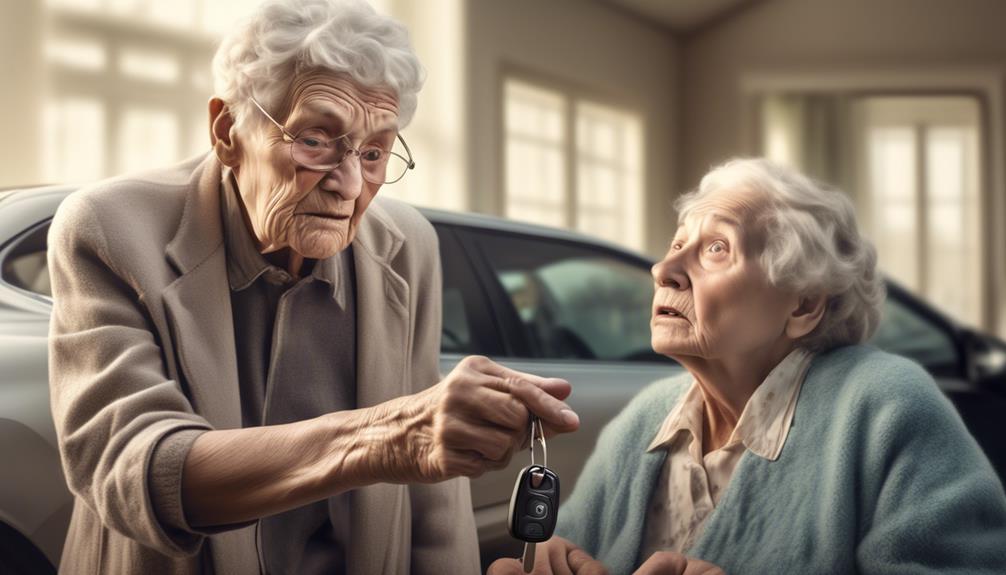Caregiver Tips
Dementia and Driving: When Is It Time to Give Up the Keys?
A pivotal question arises: when should one consider relinquishing the keys for a loved one with dementia? Explore the intricate balance between autonomy and safety in this crucial discussion.

Imagine a scenario in which a relative suffering from dementia begins forgetting familiar routes or struggles with reacting to traffic signals. This situation poses a critical question: when is it time for them to give up driving?
As we navigate the intricate intersection of dementia and driving, examining the gray area between independence and safety becomes imperative.
Join us in exploring the delicate balance between autonomy and protection in this crucial discussion.
Key Takeaways
- Early discussions on driving abilities vital
- Utilize alternative transportation options
- Seek professional evaluation for safety
- Support transition process with compassion
Warning Signs of Unsafe Driving
Recognizing warning signs of unsafe driving due to dementia is crucial for ensuring the safety of individuals behind the wheel and those sharing the road with them. When it comes to driving with dementia, warning signs can manifest in various ways, such as confusing the brake and gas pedals, making sudden lane changes without signaling, or getting lost on familiar routes. These signs often indicate a decline in hand-eye coordination, decision-making abilities, and reflexes, which are essential for safe driving.
Individuals with dementia may also exhibit signs like expressing nervousness or anger while driving, receiving increased traffic tickets, or finding themselves lost in places they know well. Moreover, difficulty judging space or distance, struggling with multitasking, and needing reminders for personal care tasks can further highlight the challenges they face behind the wheel. Addressing these warning signs promptly is vital to safeguard both the individual with dementia and others on the road from potential accidents or harm.
Initiating the Conversation

Early on, it's crucial to engage the individual with dementia in discussions about their driving abilities to address potential safety concerns. Family members play a vital role in initiating this conversation with empathy and understanding. When broaching the topic, it's essential to consider the cognitive impairments associated with Alzheimer's disease and how they may impact driving safety. Involving an occupational therapist can provide valuable insights into the individual's capabilities behind the wheel.
Approaching the discussion with sensitivity towards the person's feelings and emotions is key. By involving them in the decision-making process, they can feel a sense of ownership over the outcome. Highlighting the importance of safety for both the driver and others on the road can help emphasize the necessity of addressing driving concerns. Remember to appeal to the individual's sense of responsibility to promote a cooperative approach to this challenging conversation.
Exploring Alternative Transportation Options
Considering the challenges of giving up driving due to dementia, exploring alternative transportation options becomes a crucial step in maintaining mobility and independence. When faced with the transition away from driving, there are several options available to help individuals continue their daily activities and stay connected to their community:
- Pre-paid taxi plans: These plans offer a convenient and flexible way for seniors to get around without having to worry about handling cash or payment during the ride.
- Public transportation services: Utilizing buses, trains, or other public transportation options can be a cost-effective and accessible way for individuals who are no longer driving to travel independently.
- Community organizations: These groups often provide specialized transportation services tailored to the needs of seniors, ensuring they can still attend appointments, social gatherings, and run errands.
Exploring these alternatives, along with relying on family members, friends, or delivery services for assistance, not only helps with practical transportation needs but also fosters social connections and supports independence during this challenging time.
Seeking Professional Evaluation

As individuals navigate the challenges of dementia affecting their driving abilities, seeking professional evaluation from occupational therapists is a crucial step towards ensuring safety on the road. These evaluations by trained professionals can effectively assess the impact of dementia on driving skills. Recommendations stemming from these assessments may include restrictions or cessation of driving to prioritize safety for both the individual and others on the road.
Regular assessments during office visits can also help in detecting any declines in driving abilities due to dementia. It's essential to be aware of state regulations, as some may require healthcare providers to report dementia diagnoses that affect driving capabilities. In such cases, seeking a professional evaluation becomes even more critical to comply with legal requirements and ensure the safety of all road users.
For those seeking expert evaluation services, the American Occupational Therapy Association offers a national database of driving specialists who can provide thorough assessments tailored to individual needs. This resource can assist in making informed decisions regarding driving abilities and help in navigating the complexities of driving with dementia.
Supporting the Transition Process
To ease the transition process of giving up driving for individuals with dementia, initiating discussions with the doctor's involvement can provide valuable support and guidance. Engaging the person with dementia in decision-making about giving up driving can facilitate a smoother transition.
Discussing safety concerns for both the driver and others involved is crucial during the transition process. Appealing to the person's sense of responsibility can aid in the acceptance of the need to give up driving. It's important to consider alternative transportation options and familiar routes to help the individual feel more comfortable with the change.
Acknowledging the potential loss of independence and addressing it sensitively can make the transition process smoother. Supporting the transition with compassion and understanding can help the person with dementia adjust to this significant life change while prioritizing safety for all.
Frequently Asked Questions
At What Stage of Dementia Should You Stop Driving?
When it comes to driving and dementia, it's crucial to prioritize safety. As the condition progresses, it's important to consider giving up the keys sooner rather than later.
Evaluating driving abilities regularly and seeking guidance from healthcare professionals can help determine the right time to stop driving.
What Are 3 Things to Never Do With Your Loved One With Dementia?
When dealing with a loved one with dementia, there are three crucial things to avoid: causing arguments over their driving abilities, abruptly confiscating their car keys, and disregarding signs of unsafe driving behavior. These actions can lead to increased resistance, distress, and potential dangers on the road.
Instead, focus on discussing alternative transportation options, involving them in decisions, and seeking professional guidance to ensure safety and understanding during this challenging time.
At What Stage Should Someone With Dementia Go Into Care?
When considering the stage at which someone with dementia should transition into care, it's crucial to prioritize safety for both the individual and others. Signs like getting lost, confusion with directions, or accidents indicate the need for a supportive environment.
Healthcare professionals, family members, and legal advisors can help make this decision, ensuring appropriate supervision and specialized care. Transitioning into care can provide a higher level of safety and support for those with advancing dementia.
What Is the Driving Assessment for Dementia Patients?
When evaluating dementia patients for driving, a comprehensive assessment is crucial. This evaluation assesses cognitive and physical abilities relevant to safe driving.
Occupational therapists often perform these assessments, testing reaction time, decision-making, and spatial awareness. Regular assessments can detect changes in driving skills.
Recommendations may include restrictions, retesting schedules, or stopping driving altogether to ensure safety. It's essential to prioritize safety and make informed decisions based on the assessment results.
Conclusion
As we navigate the challenging decision of when to give up the keys for a loved one with dementia, it's important to remember that safety comes first.
By recognizing warning signs, initiating conversations, exploring alternative transportation options, seeking professional evaluation, and supporting the transition process, we can ensure the well-being of our loved ones and others on the road.
Remember, making this decision with empathy and understanding is key to keeping everyone safe.
Caregiver Tips
Unlocking Peace: Key Benefits Of Practicing Stillness

In today’s fast-paced world, finding moments of calm may seem like an impossible task. However, did you know that incorporating tranquility into your daily routine could significantly improve your overall well-being? A recent study shows that individuals who regularly embrace stillness experience a 30% reduction in stress levels and report feeling more content and happy.
Imagine being able to tap into a sense of inner peace, boost your creativity, and enhance your focus, all by simply taking a few moments to cultivate stillness in your life. The power of stillness is truly remarkable, and in the following sections, we will explore its key benefits and how you can incorporate it into your daily routine.
Key Takeaways:
- Practicing stillness can reduce stress levels by 30%.
- Regularly incorporating stillness into your routine can increase your overall contentment and happiness.
- Stillness provides a profound sense of inner peace.
- Practicing stillness boosts creativity and enhances focus.
- By cultivating moments of stillness, you can experience greater well-being and balance in your life.
The Benefits Of Stillness
When we embrace stillness, we open ourselves up to a myriad of incredible benefits that positively impact our overall well-being. Let’s explore these remarkable advantages:
1. Setting Intentions: By creating a quiet space and allowing stillness to enter our lives, we can set clear intentions and align them with our goals and dreams. Stillness provides the canvas upon which we can paint our aspirations.
2. Focus and Reflection: Amidst the chaos of daily life, stillness allows us to filter out distractions and direct our attention inward. We can reflect on our experiences, thoughts, and emotions, gaining valuable insights and a deeper understanding of ourselves.
3. Reducing External Stimuli: In a world filled with constant noise and distractions, stillness provides a much-needed respite. By intentionally seeking moments of stillness, we give ourselves the gift of peace and tranquility.
4. Calming the Nervous System: The practice of stillness has a profound impact on our nervous system, helping to reduce stress, anxiety, and overwhelm. It allows us to shift from a state of fight-or-flight to one of relaxation and calm.
5. Letting Go: Through stillness, we can release thoughts and worries that no longer serve us. It enables us to detach from negative emotions, cultivate a sense of surrender, and free ourselves from the burdens of the mind.
6. Tapping Into Intuition: Stillness opens a door to our intuition, our inner voice of wisdom. By quieting external voices and focusing inward, we can access our innate knowledge, make decisions aligned with our true selves, and navigate life’s challenges with clarity.
7. Staying Present: In a fast-paced world, stillness grounds us in the present moment. It helps us let go of regrets about the past and worries about the future, allowing us to fully embrace the beauty and joy of the present.
8. Bringing Clarity: Within stillness, we find clarity of thought and purpose. It enables us to see through the fog of confusion and uncertainty, offering a fresh perspective on life’s complexities and helping us make conscious choices.
9. Increasing Creativity: The unique space of stillness nurtures creativity within us. When we silence the noise around us, we tap into the wellspring of inspiration, leading to innovative ideas, breakthroughs, and artistic expression.
10. Improving Sleep: Stillness relaxes our minds and bodies, preparing us for restful sleep. By letting go of the day’s worries and embracing tranquility, we enhance our ability to attain a deep and rejuvenating slumber.
11. Coping with Adversity: Through the practice of stillness, we cultivate resilience and emotional strength. It enables us to find solace within, to face life’s challenges with grace and fortitude, and to emerge stronger on the other side.
Incorporating stillness into our lives grants us access to these transformative benefits. The power to find peace, clarify our thoughts, boost creativity, and navigate life’s ups and downs with resilience lies within each of us. Are you ready to embrace the benefits of stillness?
Helps You Let Go
When practicing stillness, we learn to focus on our thoughts without actively engaging in them. This process creates space for what serves us and helps us let go of what no longer serves our well-being.
By observing our thoughts without judgment, we can find peace and clarity within ourselves. Letting go of negative thoughts, worries, and anxieties becomes easier as we cultivate a sense of stillness. It allows us to release the mental burden that weighs us down and prevents us from experiencing true tranquility.
Letting go through practicing stillness doesn’t mean suppressing or ignoring our thoughts and emotions. Instead, it gives us the opportunity to acknowledge them without getting entangled in their grip. It enables us to detach and take a step back, creating a healthier relationship with our thoughts and emotions.
“Letting go gives us freedom and freedom is the only condition for happiness.” – Thich Nhat Hanh
Through stillness, we can let go of the constant stream of thoughts that often overwhelm us. It enables us to find a sense of calm acceptance and surrender to the present moment, freeing ourselves from the shackles of the past and worries about the future.
Letting go doesn’t mean we become complacent or indifferent. On the contrary, it empowers us to approach life with a greater sense of ease and resilience. We learn to accept the things we cannot change and focus on what is within our control.
As we practice stillness and let go, we create space for new possibilities and inner growth. We release attachments to outcomes and trust in the natural flow of life. This newfound sense of surrender allows us to embrace change, adapt to challenges, and find joy in the present moment.
Letting go through the practice of stillness is a transformative journey. It requires patience, self-compassion, and consistent practice. As we learn to release what no longer serves us, we pave the way for a more peaceful and fulfilling life.
Letting Go Exercise
- Sit comfortably in a quiet space, allowing yourself to relax and unwind.
- Take a few deep breaths, inhaling slowly through your nose and exhaling through your mouth.
- Bring your attention to your thoughts and observe them without judgment.
- Notice any thoughts or emotions that arise and remind yourself that you have the power to let them go.
- Visualize releasing these thoughts and emotions, imagining them flowing out of your mind and dissipating into the atmosphere.
- Repeat a calming mantra or affirmation, such as “I let go of what no longer serves me.”
- Continue observing your thoughts, gently letting go of any that arise, and returning to a state of stillness.
- Practice this exercise regularly to cultivate the art of letting go through stillness.

| Benefits of Letting Go Through Stillness | Description |
|---|---|
| Increased emotional well-being | By letting go of negative thoughts and emotions, we experience greater emotional balance and well-being. |
| Reduced stress and anxiety | Letting go helps alleviate stress and anxiety by releasing tension and promoting a state of calm. |
| Improved mental clarity | When we let go, our minds become clearer, allowing us to make better decisions and find creative solutions to challenges. |
| Enhanced self-acceptance | Letting go fosters self-compassion and self-acceptance, as we learn to embrace our imperfections and let go of self-judgment. |
| Greater resilience | Through the practice of letting go, we become more resilient and adaptable, navigating life’s ups and downs with grace and ease. |
Helps Tap Into The Intuition
Stillness is not just about finding peace and quiet in our surroundings; it is also about quieting the chaos within and listening to our own intuition. In a world filled with external voices and influences, practicing stillness allows us to tune into our inner wisdom and make decisions based on our own instincts and intuition.
When we tap into our intuition, we are able to access a deep well of knowledge and understanding that resides within us. It is a powerful tool that can guide us in making choices that align with our true selves and lead to greater fulfillment.
By taking the time to be still and quiet our minds, we create space for our intuition to rise to the surface. We become more attuned to the subtle cues and whispers that come from within, guiding us on our path. Whether it’s making a career change, embarking on a new creative endeavor, or navigating a relationship, our intuition can provide invaluable guidance and clarity.
“Intuition is the key to everything, in painting, filmmaking, business – everything. I think you could have an intellectual ability, but if you can sharpen your intuition, which they say is emotion and intellect joining together, then a knowingness occurs.”
– David Lynch
When we practice stillness, we create a sacred space within ourselves where we can listen to the whispers of our intuition. It is in this space that we can tap into our inner wisdom and trust ourselves to make decisions that are aligned with our highest good.
Fostering Intuition through Stillness
There are several practices that can help us tap into our intuition while practicing stillness:
- Meditation: Engage in a regular meditation practice to quiet the mind and connect with your intuition.
- Journaling: Spend time writing in a journal to explore your thoughts and feelings, and allow your intuition to come forth.
- Spending Time in Nature: Connect with the natural world and allow its beauty and serenity to inspire and align you with your inner voice.
- Listening to Inner Prompts: Pay attention to the little nudges and gut feelings that arise throughout your day, and trust them as guidance from your intuition.
By incorporating these practices into our lives, we can strengthen our connection to our intuition and cultivate a deep sense of trust in ourselves. The wisdom that arises from within can serve as a guiding light, leading us toward the path that is most aligned with our authentic selves.

Helps You Stay In The Present
Anxiety and stress can often consume us when we find ourselves dwelling on the past or worrying about the future. Our minds become cluttered with thoughts that take us away from experiencing the joy of the present moment. However, practicing stillness can help us stay grounded and fully embrace the here and now.
In the midst of our busy lives, taking moments of stillness allows us to pause and appreciate the little wonders that surround us. It is in these quiet moments that we can truly connect with our surroundings, our loved ones, and most importantly, ourselves.
“The present moment is the only moment where life exists.”
When we are present, we can engage fully in the activities we are involved in. Whether it’s having a conversation with a friend, enjoying a meal, or simply taking a walk in nature, being present allows us to savor the richness of each experience.
By practicing stillness, we cultivate mindfulness and train our minds to let go of distracting thoughts. We become more aware of our thoughts and emotions without getting caught up in them. This heightened sense of awareness helps us respond to situations with greater clarity and wisdom.
Let’s avoid letting our minds wander and miss out on the beauty of the present moment. Instead, let’s embrace the practice of stillness and stay present, allowing ourselves to fully engage in the gift of now.

Helps Bring Clarity
Stillness is a powerful practice that allows us to step back from the chaos of life, creating space for clarity to emerge. By embracing stillness, we can quiet the noise within, redirect our focus, and think clearly. This clarity enables us to gain a deeper understanding of our thoughts, emotions, and challenges, leading to effective problem-solving and decision-making.
When we pause and redirect our minds, we create an opportunity for clarity to arise. In the midst of confusion or overwhelm, stillness provides a calm retreat where we can gather our thoughts and find solutions. It allows us to detach ourselves from the external distractions that muddy our thinking, bringing us back to the present moment and helping us regain perspective.
“In the stillness, we find clarity.”
Practicing stillness fosters a sense of mental clarity that promotes focus, concentration, and mindfulness. By reducing mental clutter, we can better prioritize tasks, identify priorities, and achieve a state of flow. It enables us to see beyond the surface level and gain insights that may have been obscured in the busyness of our everyday lives.
With clarity, our thoughts become like a crystal-clear stream, guiding us towards the most effective and efficient actions. We become aware of our values, desires, and goals, allowing us to align our decisions and actions accordingly. By practicing stillness, we create a foundation of clarity that permeates all aspects of our lives, supporting us in finding meaning, direction, and purpose.
How Stillness Enhances Clarity
| Benefits of Stillness | Description |
|---|---|
| Enhanced focus | Redirecting attention and eliminating distractions improves concentration on the task at hand, leading to greater clarity. |
| Emotional regulation | Stillness allows us to observe and respond to emotions from a place of clarity, promoting emotional balance. |
| Mental decluttering | Quietening the mind through stillness helps clear away mental noise and create a space for clear thinking. |
| Improved decision-making | Clarity gained through stillness enables us to make informed, thoughtful decisions that align with our values and goals. |
| Deeper self-understanding | By stepping back from the chaos, we gain insight into ourselves, our thoughts, and our motivations, fostering self-awareness. |

Helps Increase Creativity
Practicing stillness is not only beneficial for finding inner peace and tranquility, but it also has a profound impact on our creativity. When we engage in stillness, we activate the right brain, which is associated with imagination and creative thinking. By tapping into our creative center through the practice of stillness, we open ourselves up to a world of endless possibilities and inspirations.
In today’s fast-paced and constantly buzzing world, it can be challenging to find moments of calm and silence. However, dedicating time to practicing stillness allows our minds to wander freely and explore new ideas. It is during these moments of stillness that our creativity truly flourishes.
During periods of stillness, our minds are unburdened by external distractions and demands, which enables us to fully immerse ourselves in the creative process. By letting go of our daily worries and stressors, we create space for innovative thoughts and fresh perspectives to emerge.
Moreover, stillness provides an opportunity for self-reflection and introspection. Through quiet contemplation, we gain deeper insights into ourselves and the world around us. This enhanced self-awareness fosters the ability to think outside the box and approach challenges from unique angles.
The practice of stillness not only increases our creativity but also enhances our problem-solving skills. By entering a state of calm and clarity, we become more receptive to new ideas and solutions. As a result, we can overcome creative blocks and find innovative ways to express ourselves.

Embracing stillness as a daily practice not only benefits our creative endeavors but also enriches our overall well-being. So, let’s make time for stillness, unlock our creative potential, and discover the extraordinary within ourselves.
Helps Improve Sleep
Practicing stillness can have a profound impact on sleep quality. By incorporating moments of calm and tranquility into our daily routine, we can achieve a relaxed state of mind that promotes better sleep. Whether it’s before bedtime or in the middle of a restless night, the practice of stillness can help us find restful slumber and wake up feeling refreshed.
The process of practicing stillness allows us to quiet our racing thoughts and reduce worries, enabling our minds to unwind from the stresses of the day. By embracing stillness, we create a space for inner peace and tranquility, providing a sense of calm that prepares us for a good night’s sleep.
Even during those nights when sleep seems elusive, the practice of stillness can come to the rescue. By focusing on deep, rhythmic breathing and gently redirecting our thoughts, we can quiet our restless minds and fall back asleep more easily.

Creating a soothing environment for sleep is essential, and practicing stillness is a powerful tool in achieving this. By incorporating practices such as meditation, mindfulness, or guided visualization, we can create moments of stillness that promote relaxation and prepare our minds and bodies for deep, restorative sleep.
“Practicing stillness has transformed my sleep quality. Instead of tossing and turning, my mind finds calm and peace, allowing me to drift into a deep slumber. It’s truly a game-changer!” – Christina, a dedicated practitioner of stillness.
Make stillness a part of your bedtime routine and experience the incredible benefits it brings to your sleep. The journey to improved sleep starts with embracing the power of stillness and cultivating moments of tranquility and peace.
Helps Cope With Adversity
Practicing stillness can be a powerful tool to cope with the adversities that life throws at us. While it may not change the situation we are facing, it can provide us with a sense of calm and resilience to navigate through challenging times.
When we practice stillness, we tap into our inner peace. It allows us to find a quiet space within ourselves, free from the chaos and turmoil that surrounds us. In this space, we can gather our thoughts, regain clarity, and find the strength to face adversity head-on.
Adversity can often leave us feeling overwhelmed and anxious. But through practicing stillness, we can cultivate a sense of inner strength and stability. It helps us develop a mindset that enables us to approach challenges with a calm and collected demeanor.
“In the midst of chaos, practicing stillness helps us find our center and maintain our balance.”
By embracing stillness, we learn to observe our thoughts and emotions without getting entangled in them. This ability allows us to detach ourselves from the negativity and stress that adversity brings, enabling us to respond with clarity and grace.
Ultimately, practicing stillness equips us with the tools we need to cope with adversity. It helps us connect with our inner wisdom and find solace amidst the storm. Whether it is through meditation, mindfulness, or simply taking a few moments of quiet reflection, the practice of stillness empowers us to face life’s challenges with resilience and inner strength.

The Benefits of Practicing Stillness in Adversity:
- Reduces stress and anxiety levels
- Increases emotional resilience
- Enhances problem-solving abilities
- Fosters a sense of calm and clarity
- Promotes self-compassion and self-care
How To Practice Stillness?
To truly reap the benefits of stillness, it is essential to incorporate regular practice into your daily routine. Here are some effective ways to practice stillness:
-
Take deep breaths: Deep breathing exercises can help calm the mind and relax the body. Find a quiet space, sit comfortably, and focus on taking slow, deep breaths. Feel the breath entering and leaving your body, allowing yourself to let go of tension and stress with each breath.
-
Practice whenever and wherever: Stillness can be practiced anywhere, at any time. Whether you’re sitting at your desk, waiting in line, or taking a walk in nature, take a moment to pause, tune into your surroundings, and be present in the moment.
-
Schedule practice time: Set aside dedicated time each day for practicing stillness. It could be early morning, during a lunch break, or before bedtime. By scheduling practice time, you prioritize stillness and make it a non-negotiable part of your daily routine.
-
Choose a favorite place: Find a quiet and peaceful space where you feel calm and relaxed. It could be a cozy corner in your home, a park bench, or even your garden. Creating a designated space for stillness can enhance your practice and make it easier to attain a state of tranquility.
-
Play soft music: Ambient and calming music can help create a serene atmosphere for practicing stillness. Choose instrumental tracks or nature sounds that resonate with you and aid in achieving a sense of inner peace.
-
Repeat calming mantras or affirmations: Mantras or affirmations can serve as powerful tools to quiet the mind and focus your thoughts. Choose phrases that resonate with you, such as “I am calm and centered” or “I invite peace and stillness into my life.” Repeat them silently or aloud during your practice.
Remember, practicing stillness is a personal journey, and what works for one person may not work for another. Explore different techniques, be patient with yourself, and find a practice that resonates with you. Embrace the moments of stillness amidst the chaos of daily life, and allow them to nourish your soul.
“Stillness is not the absence of movement or sound. It is the presence of inner tranquility that can be found within ourselves, even amidst the busiest of times.”
– Unknown
Physical Benefits of Stillness
Practicing stillness offers a range of physical benefits that contribute to overall well-being and vitality. It has a profound impact on our bodies, helping to alleviate stress, promote better sleep, enhance concentration, and achieve emotional balance.
One of the primary physical benefits of stillness is stress relief. By consciously creating moments of stillness, we allow our bodies to relax and unwind, reducing the harmful effects of stress hormones. This can lead to improved cardiovascular health, reduced muscle tension, and a sense of calmness.
Furthermore, stillness enhances our ability to concentrate and focus. In a world filled with distractions, taking time to quiet the mind can sharpen our cognitive abilities and increase mental clarity. By practicing stillness, we train our minds to remain present and fully engaged, leading to improved productivity and performance.
Improved sleep is another significant physical benefit of stillness. By embracing moments of stillness before bed, we create a peaceful environment for our bodies and minds to rest. This allows us to achieve a deep and restorative sleep, ensuring we wake up feeling refreshed and energized.
In addition, practicing stillness contributes to emotional balance. When we cultivate a regular stillness practice, we create space to process and regulate our emotions. This can lead to a greater sense of emotional well-being, increased resilience, and the ability to respond to challenging situations with equanimity.

| Physical Benefits of Stillness |
|---|
| Stress relief |
| Improved concentration |
| Better sleep quality |
| Enhanced emotional balance |
By incorporating stillness into our daily lives, we can experience these physical benefits, nurturing our bodies and promoting overall well-being. The power of stillness lies in its ability to create a harmonious balance between our inner and outer selves, allowing us to thrive both physically and mentally.
Mental Benefits of Stillness
Practicing stillness offers a multitude of mental benefits that can significantly improve our well-being. Let’s explore some of these benefits:
Increased Self-Awareness
Stillness allows us to become more attuned to ourselves and our inner world. It provides an opportunity for introspection and self-reflection, helping us gain a deeper understanding of our thoughts, emotions, and behaviors. By cultivating self-awareness, we can make more conscious choices and live a more authentic life.
Mindfulness
Engaging in stillness encourages us to be fully present in the moment, cultivating mindfulness. It involves paying attention to our thoughts, feelings, and sensations without judgment. Mindfulness helps us develop a greater sense of clarity, focus, and resilience in the face of challenges.
“In the midst of movement and chaos, keep stillness inside of you.” – Deepak Chopra
Observing Thoughts
By practicing stillness, we can observe our thoughts without getting carried away by them. This skill allows us to create distance from negative or repetitive thoughts, reducing their influence over our mental well-being. It empowers us to respond to our thoughts in a more objective and constructive manner.
Self-Reflection
Stillness provides a space for quiet contemplation and self-reflection. It allows us to look inward, examine our values, beliefs, and aspirations, and make adjustments if necessary. Self-reflection enables personal growth and helps align our actions with our true selves.
Positive Response to Challenges
When faced with challenges or difficult situations, stillness equips us with the tools to respond in a positive and proactive manner. It cultivates a sense of calm, resilience, and emotional balance, enabling us to navigate adversity with grace and fortitude.
Embracing the mental benefits of stillness can have a transformative impact on our overall well-being, allowing us to cultivate a deeper understanding of ourselves, regulate our emotions, and foster a positive mindset.

Creating Moments of Stillness
Practicing stillness is not limited to specific settings or circumstances. It can be cultivated in any situation or environment, allowing us to find moments of tranquility amidst the chaos of daily life. Here, we explore different strategies to create stillness and incorporate it into our routine.
Finding Intentional Pauses
One way to practice stillness is by intentionally pausing throughout the day. Whether it’s taking a short break from work, stepping outside for a breath of fresh air, or simply sitting quietly for a few minutes, these intentional pauses can help us reset our minds and regain focus.
Focus on the Breath
The breath is a powerful tool for centering ourselves and practicing stillness. By directing our attention to the rhythm of our breath, we can anchor our focus to the present moment and let go of distractions. Taking slow, deep breaths and feeling the sensation of each inhale and exhale can cultivate a sense of calm and stillness within.
Be Present and Practice Mindfulness
Mindfulness is a practice that involves bringing our attention to the present moment without judgment. By engaging our senses and becoming fully aware of our surroundings, we can immerse ourselves in the present and create a space for stillness to enter. Whether it’s savoring the taste of a warm cup of tea, observing the beauty of nature, or engaging in a mindful activity like yoga or meditation, being present helps us cultivate stillness.
| Strategies to Create Stillness | Usage |
|---|---|
| Intentional Pauses | Take short breaks throughout the day to reset the mind. |
| Focus on the Breath | Direct attention to the rhythm of the breath to cultivate calmness. |
| Be Present and Practice Mindfulness | Engage senses and immerse in the present moment without judgment. |
Finding Balance Between External Stimuli and Internal Peace
In today’s fast-paced world, we are constantly bombarded with external stimuli that can disrupt our sense of peace and stillness. Finding a balance between these external factors and our internal state is essential. This might involve setting boundaries with technology, creating a serene environment at home, or engaging in activities that bring us joy and tranquility.
By incorporating these practices into our lives, we can gradually create more moments of stillness. Remember that practicing stillness is a journey, and it may take time to find what works best for you. Embrace the process and allow yourself the space to cultivate inner calm and tranquility.

Conclusion
Incorporating moments of stillness into our daily lives can have profound effects on our overall well-being. By unlocking the power of stillness, we can find inner peace, boost creativity, enhance focus, and cultivate a sense of calm amidst the chaos of life. Practicing stillness is a journey that requires patience and dedication, but the rewards are worth it.
When we take the time to pause, reflect, and be present in the moment, we give ourselves the opportunity to recharge and rejuvenate. Stillness allows us to let go of thoughts and worries, tap into our intuition, and stay grounded in the present. It brings clarity to our minds and opens up new pathways for creativity.
By practicing stillness, we create space for inner peace and resilience, enabling us to cope with adversity and navigate life’s challenges with a calm and centered mindset. Whether it’s through deep breathing exercises, finding a quiet place, or practicing mindfulness, incorporating stillness into our daily routine can lead to a more balanced and fulfilling life.
Practicing stillness can provide numerous benefits for one’s well-being, including finding inner peace, rejuvenating the mind, boosting creativity, and enhancing focus.
Stillness allows individuals to set intentions, focus on thoughts and reflection, and reduce external stimuli. It helps calm the nervous system and acts as a stress reliever.
Stillness allows individuals to quiet external voices and listen to their intuition. It helps tune into inner wisdom and make decisions based on intuition rather than external influences. Anxiety and stress often stem from dwelling on the past or worrying about the future. Stillness helps individuals stay in the present moment and appreciate the little moments of joy that can be missed when consumed by thoughts of the past or future.
Stillness enables individuals to step back from problems and gain clarity in their thoughts. By pausing and redirecting the mind, individuals can think clearly and find solutions to challenges.
Stillness activates the right brain, which is associated with creativity. By practicing stillness, individuals can tap into their creative center and gain new perspectives that lead to creative results.
Practicing stillness can help individuals achieve a relaxed state of mind, reducing worries and promoting better sleep. Even in the midst of a restless night, stillness can aid in falling back asleep quickly.
Stillness allows individuals to tap into their inner peace, helping them cope with the adversities they face in life. While stillness may not change the situation, it can provide a sense of calm and resilience. There are various ways to practice stillness, including taking deep breaths, practicing whenever and wherever, scheduling practice time, choosing a favorite place, playing soft music, and repeating calming mantras or affirmations.
Stillness provides physical benefits such as stress relief, improved concentration, better sleep, and enhanced emotional balance. It helps relax the body, improve cognitive abilities, and promote emotional well-being.
Stillness offers mental benefits including increased self-awareness, mindfulness, observing thoughts, self-reflection, and positive response to challenges. It helps individuals develop a deeper understanding of themselves, regulate emotions, and promote a positive mindset.
Stillness can be cultivated in any situation or environment. It can be practiced by taking intentional pauses, focusing on breath, being present, practicing mindfulness, and finding a balance between external stimuli and internal peace.
FAQ
What are the key benefits of practicing stillness?
How does stillness help individuals let go?
How does stillness help tap into intuition?
How does stillness help individuals stay in the present?
How does stillness help bring clarity?
How does stillness help increase creativity?
How does stillness help improve sleep?
How does stillness help cope with adversity?
How can one practice stillness?
What are the physical benefits of stillness?
What are the mental benefits of stillness?
How can one create moments of stillness?
Caregiver Tips
Senior’s Guide: Part Time Work, Full Time Pay

Did you know that more than 150 million jobs around the world are expected to shift towards older workers by the end of the decade? The growing importance of older workers is increasingly evident in the labor market, as companies recognize their valuable contributions.
In this article, we will explore part-time job opportunities for seniors that offer full-time pay. We will discuss the changing workforce landscape in the United States, where an increasing number of seniors are choosing to work past the age of 75. We will also delve into specific industries and companies that provide excellent job prospects for older professionals.
Key Takeaways:
- The importance of older workers is increasing globally, with 150 million jobs expected to shift towards them by the end of the decade.
- An increasing number of seniors in the United States are choosing to work past the age of 75.
- Specific industries like ride-hailing services and companies like Delta Air Lines provide excellent part-time job opportunities for seniors.
- We have compiled a list of 20 part-time jobs for seniors that offer daily or weekly pay.
- By exploring these part-time job opportunities, seniors can unlock financial independence and enjoy a fulfilling work-life balance in their retirement years.
The Rising Importance of Older Workers
According to Bain and Company, more than 150 million jobs globally will shift towards older workers by the end of the decade. This trend is gaining traction in developed countries, indicating a change in the perception of older professionals. Organizations are recognizing the value of hiring older workers for their experience, work ethic, and expertise.
Older professionals are seen as experts, advisors, board members, and mentors, particularly in finance and engineering roles.
“The rising importance of older workers is undeniable. As organizations face the challenges of an aging workforce and a need for specialized skills, they are turning to older professionals to fill the gaps. With their wealth of knowledge and expertise, older workers bring a unique perspective and contribute to the success of the organization.”
Employment Trends for Older Workers
The Bureau of Labor Statistics reports that the workforce landscape in the United States is experiencing a notable shift, with an increasing number of Americans choosing to work past the age of 75. The oldest baby boomers approaching their 80s contribute to this trend, along with advancements in healthcare prolonging careers. The percentage of individuals over 75 who are employed has risen from 5% in 2002 to 8% in 2022, and the Labor Department projects that 1 in 10 people over 75 will still be actively working by 2032.
This employment trend for older workers is a reflection of changing societal attitudes towards retirement and the recognition of the valuable contributions that older individuals can make in the workforce. Employers are increasingly realizing that older workers bring a wealth of experience, skills, and knowledge to the table, which can benefit both the organization and the individual.
“By hiring older workers, companies can tap into a talent pool that often has a strong work ethic, vast experience, and a deep understanding of customer needs.”
This employment trend also aligns with the shifting demographics in the United States, with a growing population of older individuals due to increased life expectancy and the aging baby boomer generation. As a result, older workers are continuing their careers or re-entering the workforce after retirement to stay active, contribute to society, and maintain financial stability.
Employment opportunities for older workers extend across various industries, including healthcare, retail, education, and professional services. Older workers can leverage their years of experience, transferable skills, and extensive networks to find fulfilling part-time or full-time positions.

The Gig Economy and Ride-Hailing Services
Ride-hailing services like Uber and Lyft have revolutionized the way we travel. They have not only transformed the transportation industry but have also created new income opportunities for seniors in the United States.
In fact, according to a 2015 survey, 23% of Uber drivers are 50 years or older. These ride-hailing companies actively recruit and welcome older individuals to their platforms. They recognize the value that seniors bring, such as their experience, professionalism, and dedication.

Uber, in particular, has taken steps to address the needs of the aging population. They understand that independent mobility is crucial for seniors to maintain their active lifestyle and quality of life. Through their services, seniors can have access to convenient and reliable transportation options.
At Uber, we are committed to enhancing the mobility of seniors and improving their overall well-being. We believe that everyone, regardless of age, should have access to safe and reliable transportation. Our platform offers opportunities for seniors to earn extra income while contributing their valuable skills and knowledge.”
Ride-hailing services have provided seniors with the flexibility to work on their own terms and earn income on their schedule. Whether it’s driving passengers to their destinations or delivering food, seniors can choose the gig that best suits their preferences and availability.
With the rise of the gig economy and ride-hailing services, seniors now have more options than ever to supplement their retirement income. These platforms allow them to monetize their time and skills, providing financial stability and a sense of purpose.
If you’re a senior looking for a flexible and rewarding part-time opportunity, consider joining the gig economy and exploring the possibilities offered by ride-hailing services. It’s a chance to embark on a new adventure, connect with people, and make a meaningful impact on your community.
Delta Air Lines and Opportunities for Seniors
At Delta Air Lines, we recognize the immense value that experienced individuals bring to our organization. We offer various opportunities for seniors in roles such as customer service, administration, and airport operations. Whether you have a background in management, problem-solving, or customer assistance, we have positions that can utilize your skills and expertise.
As part of our commitment to supporting veterans, we actively engage with military personnel, streamlining their transition to civilian careers. We understand the unique strengths and perspectives that veterans bring to the workplace and are proud to be named one of America’s Best Employers for Veterans by Forbes.
Working at Delta Air Lines not only provides an opportunity for seniors to stay engaged and active but also offers the chance to be part of an organization that values diversity, inclusion, and teamwork. Join our team and be part of a company that connects people, cultures, and communities across the globe.
Learn more about the opportunities available at Delta Air Lines and how you can be part of our team by visiting our website or contacting our recruitment department.

Delta Air Lines Job Opportunities for Seniors
| Role | Department | Weekly Salary |
|---|---|---|
| Customer Service Representative | Customer Service | $700 |
| Administrative Assistant | Administration | $750 |
| Airport Operations Agent | Airport Operations | $800 |
Part-Time Jobs for Seniors That Pay Daily or Weekly
We understand that part-time jobs can be a great opportunity for seniors to supplement their income and stay active in the workforce. That’s why we’ve carefully curated a list of 20 part-time jobs that offer daily or weekly pay. These jobs are specifically selected for seniors, taking into consideration their unique skills, preferences, and availability.
Golf Course Marshall
Golf Course Marshall is an ideal part-time job for retired seniors who enjoy spending time outdoors and have a passion for golf. As a marshal, you’ll ensure the smooth flow of play, enforce course rules, and provide assistance to players. Average weekly salary: $552.
Tour Guide
If you have a knack for storytelling and love interacting with people, working as a tour guide might be a perfect fit. Share your expertise and passion for a specific location or attraction while leading visitors on unforgettable experiences. Average weekly salary: $622.
Medical Biller
Medical billing is a popular remote job option for seniors with attention to detail and organizational skills. With the healthcare industry growing rapidly, there is a constant need for experienced individuals to handle medical billing tasks. Average weekly salary: $655.
Greeter
Greeter positions are ideal for social seniors who enjoy meeting new people and providing a warm welcome. Whether it’s in a retail store, hotel, or event venue, being a greeter allows you to engage with customers and create a positive first impression. Average weekly salary: $718.
Data Entry Clerk
Data entry clerk positions offer flexibility and the opportunity to work remotely. If you have strong attention to detail and enjoy working independently, this job might be a perfect fit. Data entry clerks are responsible for accurately inputting information into databases or spreadsheets. Average weekly salary: $728.
Bank Teller
Bank teller positions can provide social interaction and a sense of fulfillment for seniors. Although automation is changing the banking industry, bank tellers continue to play a vital role in assisting customers with their financial needs. Average weekly salary: $730.
Tax Preparer
As a tax preparer, you can leverage your knowledge and experience to help individuals and businesses navigate the complexities of the tax system. This job is especially in demand during tax season and allows you to stay mentally active and financially independent. Average weekly salary: $801.
These are just a few examples of the part-time jobs available to seniors that offer daily or weekly pay. Whether you’re looking for a flexible schedule, social interaction, or the opportunity to utilize your skills, there’s a part-time job out there that can meet your needs. Remember, it’s never too late to embark on a new adventure and find fulfilling work in your retirement years.

Golf Course Marshall
Looking for the perfect part-time job as a retired senior? Consider becoming a golf course marshal. This opportunity provides a relaxed environment, flexible hours, and ample opportunities for social interaction. Whether you’re an avid golfer or simply enjoy spending time outdoors, this job allows you to combine leisure with work.
As a golf course marshal, your role is to ensure that players adhere to the course rules, maintain a steady pace of play, and provide assistance when needed. You’ll have the opportunity to interact with golfers of all skill levels and create a welcoming and enjoyable experience for them.
One of the greatest benefits of being a golf course marshal is the flexibility it offers. Many golf courses have morning and afternoon shifts, allowing you to choose the hours that suit you best. Whether you prefer to work a few days a week or only on weekends, you can tailor your schedule to fit your lifestyle.
Now, you’re probably wondering about the compensation. The average weekly salary for a golf course marshal is $552, making it a rewarding part-time job for retirees.
Why Choose a Golf Course Marshall Job?
There are several reasons why becoming a golf course marshal is an appealing option for seniors looking for a fulfilling part-time job:
- Enjoy the outdoors: Spend your work hours surrounded by the beauty of well-maintained greens and fairways.
- Flexible schedule: Work the hours that fit your needs, allowing you to maintain a healthy work-life balance.
- Social interaction: Engage with golfers from all walks of life, building connections and creating memorable experiences.
- Stay active: Keep yourself physically and mentally fit as you navigate the golf course and interact with players.
- Opportunity for golf perks: Some golf courses offer benefits like discounted or even free rounds of golf for their marshals.
If you’re passionate about golf and enjoy being part of a vibrant community, a golf course marshal job could be the perfect fit for you.
Job Title Average Weekly Salary Golf Course Marshal $552
So why wait? Embrace the opportunity to work in a relaxing environment, surrounded by fellow golf enthusiasts. Start your journey as a golf course marshal today and enjoy the perfect blend of work and play.

Tour Guide
Retired seniors have a unique opportunity to embark on a fulfilling part-time job as tour guides. With their wealth of life experience, they can engage and connect with people from different backgrounds, sharing valuable insights and stories. Serving as a tour guide allows seniors to showcase their knowledge and passion for a particular location or subject, enhancing the overall travel experience for visitors.
As tour guides, seniors can play a pivotal role in creating memorable journeys and fostering cultural exchange. They have the chance to showcase the hidden gems of a destination, provide historical context, and offer personalized recommendations. Whether it’s leading city tours, guided museum visits, or nature excursions, being a tour guide unlocks opportunities for seniors to share their expertise and make a positive impact on travelers’ lives.
“Being a tour guide allows me to combine my passion for history with my love for meeting new people. I enjoy sharing captivating stories and creating meaningful connections during each tour.”
– Jane Thompson, retired historian and tour guide
Benefits of Being a Tour Guide for Seniors
- Flexibility: Tour guide positions often offer flexible schedules, allowing seniors to choose part-time hours that suit their lifestyle and commitments.
- Active and Engaging: As tour guides, seniors remain mentally stimulated, physically active, and engaged with their community, providing a sense of purpose in their retirement years.
- Continuous Learning: Being a tour guide offers opportunities to learn and explore new facets of a destination, deepening one’s knowledge and understanding of the world.
- Social Interaction: Tour guiding fosters connections and social interaction, enabling seniors to meet people from diverse backgrounds and forge lasting friendships.
| Job | Average Weekly Salary | Industry |
|---|---|---|
| Tour Guide | $622 | Tourism and Hospitality |
Table: Average weekly salary for a tour guide in the tourism and hospitality industry.
Embarking on a career as a tour guide allows retired seniors to combine their passion for exploration, knowledge, and human connections with a rewarding part-time job. By leveraging their life experience and sharing their expertise, seniors can create unforgettable experiences for travelers while enjoying a satisfying and fulfilling work-life balance.

Medical Biller
As the healthcare industry continues to expand, the demand for medical billers is on the rise. This can be an excellent part-time job option for retired seniors looking to stay active and earn extra income. Many companies in the United States are actively seeking qualified individuals for medical billing positions, making it an accessible opportunity for seniors with relevant experience.
One of the advantages of working as a medical biller is the potential for remote job opportunities. With the advancement of technology and the widespread use of electronic health records, many medical billing tasks can now be performed from the comfort of your own home. This flexibility is particularly appealing to retired seniors seeking part-time work that allows them to maintain a good work-life balance.
When working as a medical biller, you will be responsible for processing and submitting claims, handling insurance inquiries, and ensuring accurate billing and coding. It is a role that requires attention to detail and knowledge of medical terminology and coding systems. However, you can also find positions that specialize in specific areas, such as dental or mental health billing, which can cater to your interests or previous experience.
Now, let’s take a look at the average weekly salary for medical billers:
Note: The salaries provided below are approximate figures gathered from reputable sources and may vary depending on factors such as experience, location, and company size.
| Job Title | Average Weekly Salary |
|---|---|
| Medical Biller | $655 |

As you can see, the average weekly salary for medical billers is $655. This can vary based on factors such as employment status (full-time or part-time) and level of experience.
By considering a part-time job as a medical biller, retired seniors can not only stay engaged but also make a meaningful contribution to the healthcare industry. The flexibility and remote work options make it an attractive choice, allowing seniors to balance their personal and professional lives effectively.
Expert Tip: Stay Updated with Industry Changes
Medical billing is a constantly evolving field, with new coding updates and regulations being introduced regularly. It is essential for medical billers to stay updated with industry changes to ensure accuracy and compliance. Consider joining professional organizations or attending conferences and seminars to stay abreast of the latest developments in medical billing.
Greeter
Greeter positions are particularly appealing to retired seniors who appreciate social engagement and flexible schedules. This job allows for interaction with people and is one of the most popular part-time jobs for seniors over 65. The average weekly salary for this job is $718.
Why Seniors Love Being Greeters
Being a greeter offers retired seniors the opportunity to stay connected with others and make a positive impact on people’s day. It’s a role that combines hospitality with customer service, where seniors can warmly welcome and assist individuals in various settings, such as retail stores, event venues, and healthcare facilities.
As a greeter, seniors get to be the friendly face that sets the tone for customers’ experiences. They can offer directions, answer questions, and provide helpful information. By sharing their knowledge and kind demeanor, greeters make individuals feel valued and leave a lasting impression.
Flexible Schedules and Social Interaction
One of the key reasons why greeter positions are popular among seniors is the flexibility they offer in terms of working hours. Many roles allow seniors to choose part-time shifts that accommodate their lifestyle and personal commitments. Whether it’s a few hours a day or a couple of days a week, seniors can tailor their work schedule to suit their needs.
In addition to flexible schedules, greeter positions provide ample opportunities for social interaction. Seniors who enjoy engaging with people and building connections will find this role fulfilling. It allows them to meet and interact with a diverse range of individuals, providing social engagement and a sense of belonging.
Average Weekly Salary for Greeter Positions
| Company | Industry | Average Weekly Salary |
|---|---|---|
| ABC Retail | Retail | $700 |
| XYZ Event Center | Event Services | $750 |
| 123 Healthcare | Healthcare | $725 |
Note: The average weekly salary for greeter positions may vary depending on location, experience, and industry. These figures are based on current market data and are subject to change.

Data Entry Clerk
Data entry clerk positions offer excellent opportunities for retired seniors looking for part-time work. This role allows them to work independently, utilizing their attention to detail and organizational skills. Data entry clerks play a crucial role in ensuring accurate and efficient data management for various industries.
When it comes to compensation, data entry clerks can expect a decent salary. The highest paying industries for data entry operators are the Postal Service and Texas offers the highest hourly mean wage. On average, data entry clerks can earn a weekly salary of $728.

Industry Comparison for Data Entry Clerks
| Industry | Average Hourly Wage |
|---|---|
| Postal Service | $23.19 |
| Pipeline Transportation | $18.95 |
| Electric Power Generation, Transmission, and Distribution | $18.58 |
| Petroleum and Petroleum Products Merchant Wholesalers | $18.57 |
| Motor Vehicle and Motor Vehicle Parts and Supplies Merchant Wholesalers | $18.53 |
Working as a data entry clerk allows retired seniors to contribute their skills while maintaining flexibility in their schedules. The job’s emphasis on accuracy and attention to detail makes it a perfect fit for individuals who enjoy precision-oriented work.
Bank Teller
Bank teller jobs can be an excellent option for seniors seeking part-time employment. These positions offer social interaction, flexible hours, and the opportunity to contribute to the community. As bank tellers, seniors can utilize their financial expertise and customer service skills to assist customers with their banking needs.
However, it’s important to note that bank teller roles are evolving due to advancements in technology and automation. As banks continue to implement digital banking solutions, the demand for traditional bank tellers may decrease over time. Artificial intelligence (AI) and self-service options are becoming more prevalent, allowing customers to perform transactions without the need for in-person assistance.
Despite the potential impact of automation, bank teller jobs will likely remain relevant for the foreseeable future. Many customers still prefer face-to-face interactions and appreciate the personal touch that bank tellers provide. Additionally, bank tellers play a crucial role in safeguarding against fraudulent activities and ensuring the accuracy of transactions.
Skills and Qualifications
To excel as a bank teller, seniors should possess excellent communication skills, attention to detail, and basic math proficiency. Strong interpersonal skills are essential for building rapport with customers and addressing their concerns. Additionally, familiarity with banking software and cash handling experience can be advantageous.
Job Outlook and Salary
The average weekly salary for bank tellers is approximately $730. While the demand for traditional bank tellers may decrease, there will still be a need for customer service-oriented individuals who can provide personalized assistance to customers.
Table 12.1 shows the projected employment and job growth for bank tellers:
| Year | Employment | Job Growth |
|---|---|---|
| 2021 | 452,400 | -9% |
| 2022 | 450,200 | -0.5% |
| 2023 | 449,000 | -0.3% |
| 2024 | 447,800 | -0.3% |
| 2025 | 446,600 | -0.3% |

Tax Preparer
As seniors seek opportunities for part-time work, many consider becoming tax preparers. This role allows them to stay engaged, make the most of their knowledge and experience, and continue to contribute to their communities. Working as a tax preparer provides a sense of purpose and keeps seniors mentally active, as they navigate the complexities of the ever-changing tax landscape.
Being a tax preparer also offers flexibility, allowing seniors to work on a part-time basis and balance their personal commitments. Whether it’s assisting individuals, families, or small businesses, tax preparers play a crucial role in helping clients navigate the intricacies of tax regulations and maximize their refunds or minimize their liabilities.
With the average weekly salary for a tax preparer reaching $801, this part-time job can provide financial stability while still allowing seniors to enjoy their well-deserved retirement.
If you are interested in pursuing a career as a tax preparer, there are various training programs and certifications available that can enhance your knowledge and credentials in this field. Additionally, being detail-oriented, analytical, and proficient in tax software are valuable qualities for a tax preparer.
Why Seniors Excel as Tax Preparers
Seniors bring a unique set of skills and qualities to the role of tax preparers:
- Experience: Seniors have accumulated a wealth of life experience, including previous employment, entrepreneurship, and personal financial management, which enables them to understand the financial complexities clients face.
- Attention to Detail: With years of experience, seniors have developed a keen eye for detail, ensuring that every relevant figure and deduction is accurately recorded.
- Interpersonal Skills: Seniors possess strong interpersonal skills, allowing them to build rapport with clients, establish trust, and effectively communicate complex tax concepts in a manner that is easily understood.
- Empathy: A key trait of successful tax preparers is the ability to empathize with clients and understand their unique circumstances and financial goals. Seniors often excel in this area, offering guidance and support during the tax preparation process.
As a tax preparer, I have found immense fulfillment in helping individuals and families navigate the complex tax system. The flexibility of this part-time job allows me to continue making a difference in people’s lives while enjoying my retirement years.” – John, a retired tax preparer

| Pros of Being a Tax Preparer | Cons of Being a Tax Preparer |
|---|---|
|
|
Conclusion
In conclusion, there are numerous part-time job opportunities for seniors that offer full-time pay. Retired seniors have the ability to leverage their skills, knowledge, and experience to find rewarding and fulfilling part-time jobs. The changing workforce landscape and the increasing recognition of the value of older workers contribute to the demand for seniors in various industries.
By exploring the options mentioned in this article, seniors can unlock financial independence and enjoy a fulfilling work-life balance in their retirement years. Whether it’s working as a golf course marshal, tour guide, medical biller, greeter, data entry clerk, bank teller, or tax preparer, the possibilities are diverse and cater to a range of interests and skill sets.
Part-time work no longer means sacrificing income, as many of these opportunities provide full-time pay. Seniors can confidently pursue these roles, knowing that their experience and expertise are valued and appreciated. So, if you’re a retiree looking for meaningful and financially rewarding work, consider these part-time options and embark on a new chapter of your career.
Yes, there are part-time job opportunities available for seniors that offer full-time pay. These jobs allow seniors to work flexible hours while still earning a competitive salary.
Older workers are gaining importance in the workforce because organizations recognize the value of their experience, work ethic, and expertise. They are seen as experts, advisors, mentors, and valuable contributors in various industries.
The employment landscape in the United States is experiencing a notable shift, with an increasing number of Americans choosing to work past the age of 75. Advancements in healthcare and the contribution of the oldest baby boomers approaching their 80s are contributing factors to this trend.
Ride-hailing services like Uber and Lyft actively recruit older individuals and provide them with opportunities to earn supplemental income. These companies also offer services to enhance the mobility and quality of life for seniors by providing independent transportation options. Delta Air Lines offers various job opportunities for seniors in roles such as customer service, administration, and airport operations. The company recognizes the value of veterans and has been named one of America’s Best Employers for Veterans by Forbes.
Some part-time jobs for seniors that offer daily or weekly pay include golf course marshal, tour guide, medical biller, greeter, data entry clerk, bank teller, and tax preparer. These jobs provide opportunities for flexibility, social interaction, and utilizing skills and knowledge.
The average weekly salary for a golf course marshal job is $552.
The average weekly salary for a tour guide job is $622.
Yes, many companies in the United States are seeking qualified individuals for medical billing positions, and these jobs often offer remote work opportunities, making them suitable for retired seniors. The average weekly salary for a greeter job is $718.
Yes, data entry clerk positions offer independent work opportunities and utilize attention to detail, making them suitable for retired seniors. The average weekly salary for this job is $728.
Bank teller jobs can provide social interaction and flexible hours, making them appealing to retired seniors. However, due to increasing automation, these jobs might be replaced by AI in the future. The average weekly salary for this job is $730.
Some seniors consider working as tax preparers to stay engaged, leverage their knowledge and experience, and stay mentally active. This job provides a sense of purpose and can be fulfilling for retired seniors. The average weekly salary for this job is $801.
FAQ
Are there part-time job opportunities that offer full-time pay for seniors?
Why are older workers gaining importance in the workforce?
How is the employment landscape changing for older workers in the United States?
How do ride-hailing services like Uber and Lyft provide job opportunities for seniors?
What job opportunities does Delta Air Lines offer for seniors?
What are some part-time jobs for seniors that offer daily or weekly pay?
What is the average weekly salary for a golf course marshal job?
What is the average weekly salary for a tour guide job?
Can retired seniors work as medical billers?
What is the average weekly salary for a greeter job?
Are there part-time data entry clerk positions available for seniors?
Are bank teller jobs suitable for retired seniors?
Why do some seniors consider working as tax preparers?
Caregiver Tips
Understanding Verbal Security Blankets Explained

Did you know that using certain phrases as verbal security blankets is crucial for individuals with dementia? These words or expressions provide a sense of comfort and safety, helping them navigate their surroundings. Whether it’s a simple statement like “I’m hungry” or a more significant phrase, these verbal security blankets empower them and assist in expressing their needs.
For caregivers, understanding and managing verbal security blankets can be challenging. While they provide comfort to individuals with dementia, they can also create frustration and stress. It’s important to recognize the signs and behaviors associated with verbal security blankets to better support our loved ones and provide the care they need.
Key Takeaways:
- A verbal security blanket is a phrase or group of words that individuals with dementia repeatedly express to cope with their surroundings and find comfort and security.
- Verbal security blankets can range from simple statements to more complex phrases with personal significance.
- They provide individuals with a sense of control and help them communicate their needs.
- Understanding and managing verbal security blankets can be challenging for caregivers but is essential for providing the necessary support and care.
- Recognizing the signs and behaviors associated with verbal security blankets can help caregivers better understand and respond to their loved ones’ needs.
What Is a Verbal Security Blanket in Dementia?
In dementia, a verbal security blanket serves as a coping mechanism for individuals to navigate their surroundings and find a sense of security and comfort. It helps them to express their needs, whether simple or complex, and communicate effectively with their caregivers and loved ones. Verbal security blankets play a crucial role in maintaining relationships by enabling individuals with dementia to engage in meaningful interactions.
How to Identify a Verbal Security Blanket in a Loved One with Dementia
Identifying a verbal security blanket in a loved one with dementia is crucial for caregivers to better understand and respond to their needs. By recognizing the common signs and behaviors associated with verbal security blankets, caregivers can provide the necessary support and comfort.
Common Signs and Behaviors
“Repeating the same word or phrase consistently, even in response to different questions or prompts, is a common sign of a verbal security blanket,” explains Dr. Jane Smith, a dementia specialist. “For example, if your loved one frequently says ‘I’m fine’ or ‘I don’t know’ regardless of the question, it could indicate the use of a verbal security blanket.”
In addition to repetition, individuals with dementia may have difficulty expressing their needs verbally. This can manifest as an inability to find the right words or an overall struggle to communicate effectively. Caregivers should pay attention to any expressions of anxiety or confusion that may be more prominent than usual, as these can also indicate the reliance on a verbal security blanket.
Common Signs and Behaviors Possible Explanation Repeating the same word or phrase consistently Using a verbal security blanket to find comfort and coping in their surroundings Difficulty expressing needs verbally Reliance on a verbal security blanket due to cognitive impairment Expressions of anxiety or confusion Seeking reassurance and security from a verbal security blanket
By being attentive to these signs and behaviors, caregivers can gain insights into their loved one’s emotional state and tailor their care accordingly. Understanding the role of verbal security blankets is an essential step in providing compassionate support for individuals with dementia.

Managing and Coping with a Verbal Security Blanket in Dementia
Successfully managing and coping with a verbal security blanket in dementia requires patience and understanding. Caregivers play a crucial role in providing support and comfort to their loved ones who rely on verbal security blankets to navigate their surroundings.
When responding to a repeated phrase, caregivers should exhibit patience and try to understand the context and meaning behind it. By showing empathy and compassion, caregivers can create a safe environment that encourages open communication and emotional connection.
Using distractions and redirects can be helpful in breaking the repetitive pattern and providing variety and stimulation. Engaging individuals with dementia in activities they enjoy or redirecting their attention to a different topic can help them focus on something other than the repeated phrase.
Seeking guidance from healthcare professionals, such as occupational therapists, can provide additional support and strategies for managing the use of verbal security blankets. These professionals have the expertise and experience to recommend personalized approaches that promote effective communication and enhance the overall well-being of individuals with dementia.
Expert Tip:
“When managing a verbal security blanket, it’s important to remember that the repeated phrase serves as a coping mechanism for individuals with dementia. Responding with patience, understanding, and compassion can create a sense of security and foster meaningful connections.” – Dr. Sarah Walker, Occupational Therapist

Implementing these strategies can help caregivers better manage and cope with a verbal security blanket in dementia. By providing a supportive environment and seeking professional guidance, caregivers can ensure the well-being and quality of life for their loved ones.
The Benefits of Verbal Security Blankets for Individuals with Dementia
Verbal security blankets offer several benefits for individuals with dementia. One of the significant advantages is the application of deep pressure stimulation, which can help reduce pain sensation, improve sleep quality, and alleviate symptoms of depression. These blankets provide a sense of comfort and security, allowing individuals to experience a higher level of well-being.
Deep Pressure Stimulation
The use of verbal security blankets involves deep pressure stimulation, a therapeutic technique that applies firm, gentle pressure to the body. This stimulation triggers the release of endorphins, which are known to reduce pain sensation, promote relaxation, and improve mood. By incorporating deep pressure stimulation into verbal security blankets, individuals with dementia can experience physical and emotional relief.
Reduce Pain Sensation
Research suggests that deep pressure stimulation can have a profound impact on reducing pain sensation. For individuals with dementia who may experience chronic pain or discomfort, the use of verbal security blankets can provide a soothing effect, helping to alleviate their suffering. The gentle pressure from the blankets can stimulate sensory receptors, reducing the brain’s perception of pain and increasing overall comfort.
Improve Sleep
Sleep disturbances are common among individuals with dementia, often leading to increased agitation and behavioral challenges. Verbal security blankets can play a crucial role in improving sleep quality. The deep pressure stimulation they provide helps regulate the body’s natural sleep-wake cycle, promoting a state of relaxation and aiding in the transition to sleep. By incorporating verbal security blankets into bedtime routines, individuals with dementia can experience more restful and rejuvenating sleep.
Reduce Symptoms of Depression
Dementia is often accompanied by symptoms of depression, including feelings of sadness, hopelessness, and loss of interest in activities. Verbal security blankets can contribute to the reduction of these symptoms by providing individuals with a sense of comfort and security. By offering a repetitive and familiar phrase or word, these blankets act as a source of emotional support, helping individuals with dementia feel more grounded and connected.
Summary of Benefits
| Benefits | Description |
|---|---|
| Reduced Pain Sensation | Deep pressure stimulation from verbal security blankets can help alleviate pain and discomfort. |
| Improved Sleep | Verbal security blankets promote relaxation and aid in improving sleep quality. |
| Reduced Symptoms of Depression | By providing comfort and emotional support, verbal security blankets can help alleviate symptoms of depression. |
Overall, verbal security blankets offer significant benefits for individuals with dementia, including deep pressure stimulation, pain reduction, improved sleep, and reduced symptoms of depression. Caregivers and healthcare professionals can leverage these benefits to enhance the well-being and quality of life for those living with dementia.

Strategies for Managing and Coping with a Verbal Security Blanket
Caregivers play a crucial role in effectively managing and coping with a verbal security blanket in individuals with dementia. By employing appropriate strategies, caregivers can provide the necessary support and comfort to their loved ones. Here are some key strategies to consider:
1. Respond with Patience and Understanding
When a person with dementia repeatedly expresses a verbal security blanket, it is essential to respond with patience and understanding. Recognize that these repetitive phrases serve as coping mechanisms for individuals in navigating their surroundings and finding comfort. Responding with empathy can help foster a sense of security and maintain a positive caregiver-patient relationship.
2. Use Distraction and Redirection
Breaking the repetitive pattern of a verbal security blanket can be achieved through the use of distraction and redirection techniques. Introduce engaging activities or topics to divert their attention from the repeated phrase. For example, you can engage them in a favorite hobby, discuss a pleasant memory, or play soothing music. By providing alternative stimuli, you can help create variety and stimulation, leading to reduced reliance on the verbal security blanket.
3. Seek Guidance from Healthcare Professionals
Healthcare professionals, such as occupational therapists, are valuable resources for caregivers seeking additional support and strategies tailored to the individual’s needs. These professionals can provide expert advice on managing verbal security blankets and offer techniques specific to the challenges faced by the person with dementia. Don’t hesitate to consult them to ensure the best possible care.
“Responding with empathy can help foster a sense of security and maintain a positive caregiver-patient relationship.”
Implementing these strategies can significantly improve the caregiver’s ability to manage and cope with verbal security blankets effectively. Remember, the goal is to provide comfort and support while fostering a sense of security and well-being for individuals with dementia.

Table: Strategies for Managing and Coping with a Verbal Security Blanket
Strategy Description Respond with Patience and Understanding Recognize the purpose of verbal security blankets and respond with empathy, fostering a positive caregiver-patient relationship. Use Distraction and Redirection Introduce engaging activities or topics to break the pattern of repetitive phrases, providing variety and stimulation. Seek Guidance from Healthcare Professionals Consult healthcare professionals, such as occupational therapists, for expert advice and tailored strategies.
Transitioning to a Learning Organization
To promote innovation and creativity within your company, it is crucial to transition to a learning organization. This involves creating an organizational culture that encourages employees to be creative, make suggestions, and experiment with new solutions. By fostering a culture of learning, your company can stay on the forefront of change and continuously adapt to new challenges and opportunities.
One of the key strategies for promoting a learning organization is investing in training and development opportunities. Providing employees with the chance to expand their knowledge and skills not only enhances their individual growth but also drives innovation and process improvements within the company. It empowers employees to think critically, take risks, and contribute new ideas.
In order to successfully transition to a learning organization, it’s important to establish clear goals and objectives. This includes defining what learning means within your company and aligning it with your overall business strategy. By setting specific learning objectives, you can focus on developing the skills and competencies necessary to drive innovation and creativity.
“A learning organization is an essential component of fostering innovation and creativity. By promoting a culture of continuous learning, companies can empower their employees to push boundaries, explore new ideas, and find innovative solutions to complex problems.”
Another crucial aspect of transitioning to a learning organization is embracing a growth mindset. Encouraging employees to view challenges as opportunities for learning and development will foster a culture of resilience and innovation. Leaders play a vital role in promoting this mindset by demonstrating a willingness to learn, adapt, and embrace change.
Furthermore, creating platforms for knowledge-sharing and collaboration can significantly contribute to the effectiveness of a learning organization. Encouraging cross-functional teams, organizing brainstorming sessions, and facilitating open communication channels allows employees to learn from one another, share ideas, and collaborate on innovative projects.
In summary, transitioning to a learning organization is key to promoting innovation and creativity within your company. By fostering a culture of continuous learning, providing training and development opportunities, and embracing a growth mindset, you can empower your employees to drive innovation and adapt to the ever-changing business landscape.
The Need for Change in the Manufacturing Company
The manufacturing company is in dire need of change due to various factors that hinder its growth and innovation. The current top-down management approach restricts employee creativity, decision-making, and experimentation, stifling the company’s potential for success. The hierarchical organizational structure discourages innovation and creates a lack of motivation among employees to contribute their ideas and suggestions.
Furthermore, the company’s outdated processes and software systems pose significant challenges to efficiency and effectiveness. The antiquated inventory management systems slow down operations and hinder the company’s ability to adapt to changing market demands. These outdated systems limit the company’s agility and hinder its potential for growth and improvement.
To address these challenges, the manufacturing company needs to embrace change and adopt a more flexible and inclusive management approach. This shift will empower employees to contribute their unique insights and ideas, fostering a culture of creativity and innovation. Additionally, investing in modern processes and software systems will enhance efficiency and enable the company to stay competitive in the ever-evolving market.
Key Challenges:
- Lack of employee creativity, decision-making, and experimentation due to top-down management
- Hierarchical organizational structure discouraging innovation and growth
- Outdated processes and software systems hindering efficiency and effectiveness
Addressing these challenges is crucial for the manufacturing company to thrive in a rapidly changing business landscape. By embracing change, adopting a more inclusive management approach, and modernizing processes and software systems, the company can unlock its full potential and achieve sustainable growth.

| Challenges | Impact | Recommended Actions |
|---|---|---|
| Top-down management approach | Limited employee creativity and decision-making | Transition to a more inclusive management style |
| Hierarchical organizational structure | Discourages innovation and stifles growth | Promote a culture of innovation and collaboration |
| Outdated processes and software systems | Challenges to efficiency and effectiveness | Invest in modernizing processes and software systems |
Planning for Change in the Manufacturing Company
As a change management consultant, your first task is to diagnose the need for change in the manufacturing company. This requires a comprehensive assessment of the current organizational structure, employee capabilities, and areas that require improvement. By understanding the existing challenges and opportunities, you can develop a change strategy tailored to meet the company’s specific needs.
Diagnostics involves analyzing various aspects of the company, including:
- The organizational structure to identify any hierarchical constraints that limit communication and innovation;
- Employee capabilities to gauge their readiness for change and identify any skills gaps;
- Operational processes and systems to identify outdated or inefficient practices;
- Market trends and customer demands to identify areas where the company needs to adapt to remain competitive.
Based on your findings, you can then develop a change strategy outlining the steps, resources, and timeline required for implementing the necessary changes. This strategy should be comprehensive and encompass all aspects of the company, from leadership and communication to training and technology upgrades.
Effective planning for change minimizes disruptions and ensures a successful transition. By developing a well-thought-out strategy, the manufacturing company can navigate the complexities of change with confidence.
Throughout the planning process, it’s crucial to collaborate closely with key stakeholders, including executives, department heads, and employees. By involving them in the planning stage, you can foster a sense of ownership and commitment, increasing the likelihood of successful implementation.
Remember, change is a journey that requires clear direction and careful navigation. By leveraging your expertise as a change management consultant, you can guide the manufacturing company through this transformative process, helping them embrace change and thrive in a dynamic business landscape.

Implementing Change in the Manufacturing Company
Implementing change in the manufacturing company requires a well-defined change management plan. This plan serves as a blueprint for navigating the transition and ensuring that the changes are implemented effectively.
Effective communication and training are key components of a successful change management plan. Clear and consistent communication helps employees understand the reasons for change, addresses any concerns or resistance, and fosters a culture of acceptance and collaboration.
Training plays a vital role in equipping employees with the necessary skills and knowledge to navigate the changes. It allows them to understand their role in the change process and empowers them to contribute effectively to the organization’s transformation.
Employee engagement is crucial during the implementation phase. By involving employees in the change process and soliciting their input, organizations can tap into their unique perspectives, ideas, and expertise. This fosters a sense of ownership and commitment to the change, increasing the chances of success.
“Change is the only constant in life.”
– Heraclitus
Benefits of Effective Change Implementation
Implementing change effectively in the manufacturing company can yield several benefits:
- Improved organizational agility and adaptability
- Increased employee satisfaction and motivation
- Enhanced productivity and efficiency
- Heightened innovation and creativity
- Strengthened competitive advantage
By embracing change and implementing it with a well-defined plan, effective communication and training, and employee engagement, the manufacturing company can navigate the transformation successfully and achieve positive outcomes.

Sustaining Change in the Manufacturing Company
In order to create lasting change within a manufacturing company, it is crucial to foster a culture of continuous improvement. This involves creating an environment in which employees are encouraged to seek opportunities for growth, innovation, and enhanced efficiency.
A key aspect of sustaining change is the regular feedback and evaluation of implemented changes. By soliciting input from employees and stakeholders, the company can gain valuable insights into the effectiveness and impact of the changes made. This feedback allows for necessary adjustments to be made and ensures that the change efforts remain aligned with the overall goals of the organization.
To facilitate ongoing learning and development, it is essential to establish mechanisms that support employee growth and engagement. This can include providing training programs, workshops, and mentorship opportunities. By investing in the continuous development of employees, the manufacturing company can ensure that they remain adaptable and responsive to future changes in the industry.
“Continuous improvement is not about the things you do well – that’s work. Continuous improvement is about removing the things that get in the way of your work. The headaches, the things that slow you down, that’s what continuous improvement is all about.” – Bruce Hamilton
To illustrate the importance of sustaining change in a manufacturing company, let’s consider an example:
Change Initiative Effectiveness Evaluation Adjustments Made Implementation of lean manufacturing principles Surveys were conducted to assess the impact on productivity and waste reduction Additional training sessions were held to address areas where employees required further support. Changes were made to the workflow based on feedback received. Upgrade of machinery and technology Key performance indicators were tracked to measure improvements in efficiency and quality Employee feedback was collected to identify any challenges or bottlenecks caused by the new technology. Adjustments were made to ensure smoother integration and minimize disruptions. Introduction of a suggestion box for process improvement ideas The number and quality of suggestions received were reviewed Regular feedback sessions were established to discuss submitted suggestions and implement viable ideas. Recognition programs were introduced to reward employees for their contributions.
By actively promoting continuous improvement, encouraging feedback and evaluation, and providing opportunities for ongoing learning and development, the manufacturing company can sustain positive change and remain competitive in an ever-evolving industry.

Conclusion
In conclusion, the management and understanding of verbal security blankets in dementia require patience, empathy, and the implementation of effective strategies. Caregivers can support their loved ones by identifying the signs and behaviors associated with verbal security blankets and providing the necessary comfort and assistance. Transitioning to a learning organization can foster innovation and creativity in the workplace, promoting growth and adaptability. For manufacturing companies, planning, implementing, and sustaining change is crucial in order to stay competitive and meet the demands of an ever-evolving business landscape.
In summary, by recognizing the importance of verbal security blankets in dementia care, caregivers can create a supportive environment that alleviates anxiety and promotes effective communication. Embracing a learning mindset can foster a culture of innovation and continuous improvement. For manufacturing companies, embracing change and implementing sustainable practices can lead to increased efficiency and productivity. By staying attentive to the needs of individuals with dementia and being open to change, both in caregiving and organizational contexts, we can create a better future for those affected by dementia and drive success in the ever-changing business world.
FAQ
What is a verbal security blanket?
A verbal security blanket is a phrase or group of words that individuals, particularly those with dementia, repeatedly express to cope with their surroundings and find comfort and security.
Why are verbal security blankets important?
Verbal security blankets provide individuals with a sense of control and help them communicate their needs. They can also offer comfort and security, promoting overall well-being.
How do I identify a verbal security blanket in a loved one with dementia?
Look for signs such as repeating the same word or phrase consistently, even in response to different questions or prompts. Difficulty expressing needs can also indicate the use of a verbal security blanket.
How can I manage and cope with a verbal security blanket in dementia?
Respond with patience and understanding, try to understand the context and meaning behind the repeated phrase, and use distractions and redirects to break the repetitive pattern.
What are the benefits of verbal security blankets for individuals with dementia?
Verbal security blankets can provide deep pressure stimulation, reduce pain sensation, improve sleep quality, and alleviate symptoms of depression. They also offer a sense of comfort and security.
What strategies can I use to manage and cope with a verbal security blanket?
Respond with patience and understanding, use distractions and redirects, and seek guidance from healthcare professionals, such as occupational therapists, for additional support and strategies tailored to your loved one’s needs.
How can my organization transition to a learning organization?
Foster a culture that encourages employee creativity, suggestions, and experimentation. Invest in training and development opportunities to drive innovation and process improvements.
What are the signs that my manufacturing company needs a change?
Look for a top-down management approach, limited employee creativity and decision-making, and outdated processes and software systems that hinder efficiency and effectiveness.
How do I plan for change in my manufacturing company?
As a change management consultant, diagnose the need for change, assess the current organizational structure and employee capabilities, and develop a change strategy outlining the steps, resources, and timeline needed.
How can I effectively implement change in my manufacturing company?
Develop a change management plan, communicate the reasons for change to employees, provide training opportunities, and engage employees throughout the process to address concerns and foster collaboration.
How can I sustain change in my manufacturing company?
Foster a culture of continuous improvement through regular feedback and evaluation. Establish mechanisms for ongoing learning and development to ensure employees remain engaged and adaptable to future changes.
-

 Dementia Care2 months ago
Dementia Care2 months agoUnderstanding the Stages of Vascular Dementia: A Visual Chart Guide
-

 Dementia Care3 months ago
Dementia Care3 months ago10 Engaging Dementia Games for Cognitive Stimulation
-

 Dementia Care3 months ago
Dementia Care3 months agoHow Gabapentin Affects Dementia: A Comprehensive Guide
-

 Dementia Care3 months ago
Dementia Care3 months ago5 Things You Need to Know About Jack Nicholson’s Dementia
-

 Dementia Care1 month ago
Dementia Care1 month agoUnderstanding Narcissism and Dementia: A How-To Guide
-

 Dementia Care1 month ago
Dementia Care1 month agoHow to Deal with a Parent’s Dementia: A Practical Guide
-

 Dementia Care1 month ago
Dementia Care1 month agoDavid Suchet’s Wife Opens Up About Living with Dementia
-

 Dementia Care1 month ago
Dementia Care1 month agoUnderstanding the Link Between Ambien and Dementia: A How-To Guide




















